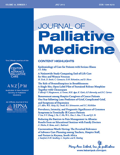
JOURNAL OF PALLIATIVE MEDICINE
Scope & Guideline
Innovating palliative practices for enhanced patient quality of life.
Introduction
Aims and Scopes
- Multidisciplinary Palliative Care Approaches:
The journal emphasizes the importance of a team-based approach to palliative care, incorporating various disciplines including medicine, nursing, social work, and spiritual care to address the complex needs of patients and families. - Research and Evidence-Based Practices:
A core aim is to disseminate research findings that contribute to evidence-based palliative care practices, ensuring clinicians are informed about the latest advancements and methodologies. - Patient and Family-Centered Care:
The journal advocates for care that prioritizes the values and preferences of patients and their families, promoting shared decision-making and communication strategies that enhance the care experience. - Cultural Competence in Palliative Care:
There is a dedicated focus on understanding and addressing the diverse cultural needs and perspectives of patients receiving palliative care, ensuring that services are equitable and respectful. - Innovative Therapeutic Interventions:
The journal explores new therapeutic options and interventions in palliative care, including pharmacological and non-pharmacological approaches, to manage symptoms and improve patients' quality of life.
Trending and Emerging
- Telehealth and Virtual Care:
Recent publications have shown a significant increase in research and discussions around telehealth and virtual care solutions in palliative medicine, especially in response to the COVID-19 pandemic. - Psychedelic-Assisted Therapies:
There is a growing interest in the exploration of psychedelic-assisted therapies for managing existential distress and psychological symptoms in palliative care patients. - Integration of Social Determinants of Health:
Emerging themes focus on the impact of social determinants of health on palliative care access and outcomes, emphasizing the need for more equitable care delivery. - Patient and Caregiver Experiences:
There is an increasing emphasis on understanding the experiences of patients and caregivers, particularly regarding communication, decision-making, and emotional support. - Innovative Supportive Care Models:
The journal is increasingly publishing on innovative supportive care models, including community-based interventions and interdisciplinary approaches that enhance palliative care delivery.
Declining or Waning
- Traditional Pain Management Techniques:
There has been a noticeable decline in articles focused solely on traditional pain management techniques, as the field shifts towards more holistic and integrative approaches to symptom management. - General End-of-Life Practices:
As the journal increasingly emphasizes advanced care planning and patient-centered communication, traditional discussions around general end-of-life practices are becoming less frequent. - Narrowly Focused Case Studies:
The journal appears to be moving away from narrowly focused case studies in favor of broader research that examines patterns, trends, and systemic issues in palliative care. - Legal and Ethical Aspects of Palliative Care:
There has been a reduction in the frequency of articles discussing the legal and ethical dimensions of palliative care, possibly due to a shift towards more practical and clinical considerations in the field. - Palliative Care in Institutional Settings:
Fewer articles are being published on the specific challenges and practices of palliative care within institutional settings, as the focus expands to community-based and home care models.
Similar Journals

JOURNAL OF CLINICAL ONCOLOGY
Advancing oncology research for a healthier tomorrow.Journal of Clinical Oncology is a premier academic journal published by Lippincott Williams & Wilkins, dedicated to the field of oncology and cancer research. Since its inception in 1983, this influential journal has consistently ranked in the Q1 category across multiple disciplines, including cancer research, medicine, and oncology, reflecting its critical role in shaping the future of cancer therapeutics and patient care. With a Scopus ranking of #9 in Medicine - Oncology and #6 in Biochemistry, Genetics and Molecular Biology - Cancer Research, Journal of Clinical Oncology publishes cutting-edge original research, reviews, and clinical updates that are essential for professionals, researchers, and students alike. Although it does not currently offer open access options, it provides invaluable insights and evidence-based findings that are crucial for advancing oncological knowledge and improving patient outcomes globally. The journal’s continued commitment to excellence ensures its place as a vital resource in the oncological community.
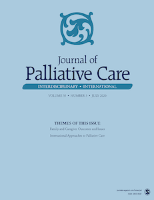
JOURNAL OF PALLIATIVE CARE
Elevating Quality of Life Through Palliative InsightsJOURNAL OF PALLIATIVE CARE is a premier publication in the field dedicated to advancing the understanding and practice of palliative care. Published by SAGE Publications Inc, this journal serves as a vital platform for researchers, healthcare professionals, and students who are at the forefront of improving patient quality of life across various medical contexts. Since its inception, the journal has provided a rich repository of interdisciplinary research and insightful articles, addressing essential topics such as pain management, end-of-life care, and psychological support. With a respectable impact factor and a Q3 quartile ranking in the miscellaneous medicine category, it reflects the growing importance of palliative care in contemporary healthcare. The journal covers pivotal research from 1985 to 2015 and 2017 to 2024, underscoring its commitment to fostering a well-rounded discourse within the medical community. Researchers seeking to contribute to the field will find this journal an invaluable resource for disseminating cutting-edge findings and practical applications.
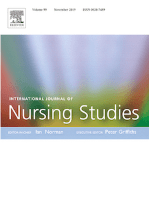
INTERNATIONAL JOURNAL OF NURSING STUDIES
Elevating healthcare through innovative nursing studies.INTERNATIONAL JOURNAL OF NURSING STUDIES, published by PERGAMON-ELSEVIER SCIENCE LTD, stands as a leading journal in the field of nursing, holding a remarkable impact in the academic community with its prestigious Q1 ranking in Nursing (miscellaneous) and a commendable position in the 99th percentile of General Nursing according to Scopus rankings. Since its inception in 1963, the journal has consistently aimed to foster the dissemination of significant research, innovative practices, and comprehensive reviews relevant to nursing and healthcare disciplines. With a commitment to high-quality, peer-reviewed content, it serves as an invaluable resource for researchers, healthcare professionals, and students alike, seeking to advance knowledge and improve patient care outcomes. While it is not an open-access journal, the impactful research published within its pages is vital for the development of nursing science globally, making it a cornerstone of current nursing scholarship.

Onkologie
Exploring Innovations in Cancer Care and Research.Onkologie is a peer-reviewed academic journal published by SPRINGER HEIDELBERG, focusing on the evolving fields of Oncology and Hematology. Established as a significant platform for the dissemination of research in these crucial areas of medicine, Onkologie aims to provide insights into the latest advancements, therapeutic strategies, and clinical practices that shape patient care in oncology and hematology. Despite its current placement in the Q4 category for both disciplines, this journal aspires to foster scholarly dialogues and enhance its contributions to the scientific community. The journal is based in Germany and encourages submissions that promote a deeper understanding of oncology's complex landscape, ensuring that researchers, clinicians, and students have access to a wealth of knowledge essential for clinical practice and further research. With an ISSN of 2731-7226 and E-ISSN of 2731-7234, Onkologie is committed to maintain high standards in publication and peer review, driving innovation and discovery in the fields it represents.
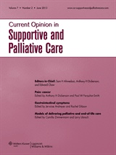
Current Opinion in Supportive and Palliative Care
Navigating the complexities of critical care with expertise.Current Opinion in Supportive and Palliative Care, an esteemed journal published by Lippincott Williams & Wilkins, provides a vital platform for the dissemination of contemporary research and expert perspectives in the fields of supportive and palliative care. As part of the medical community's growing focus on critical care and oncology, this journal has earned its place in the Q2 category across multiple rankings, reflecting its influence and significance in advancing knowledge and practices. With its ISSN 1751-4258 and E-ISSN 1751-4266, it covers literature from 2007 to 2024, making it a reliable resource for the latest developments. While it does not offer open access, the journal ensures careful curating of high-quality articles, fostering a deeper understanding of complex care needs. Researchers, clinicians, and students alike will benefit from the journal's insights, exploring innovative strategies and multidisciplinary approaches to improve patient outcomes in critical situations. The commitment to such a crucial area of healthcare underscores the importance of this publication in shaping future practices and policies.
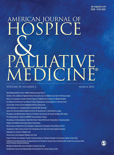
American Journal of Hospice & Palliative Medicine
Empowering healthcare professionals with cutting-edge palliative practices.The American Journal of Hospice & Palliative Medicine, published by SAGE Publications Inc, is a leading peer-reviewed journal dedicated to advancing the field of hospice and palliative medicine. With its ISSN 1049-9091 and E-ISSN 1938-2715, the journal has been a vital resource since its inception in 1984, aiming to provide comprehensive insights into clinical practices, innovations, and research findings that enrich the quality of life for patients with serious illnesses. It holds a prestigious position as a Q2 journal in the field of medicine (miscellaneous), ranked #139 out of 636 in General Medicine with an impressive 78th percentile standing according to Scopus. The journal does not currently operate under an Open Access model, ensuring rigorous review and quality control of its content. Researchers, clinicians, and students are encouraged to engage with the latest developments and evidence-based practices in palliative care as the journal continues to shape discussions and policies in this critical area of healthcare.
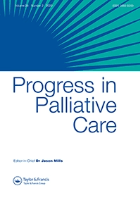
PROGRESS IN PALLIATIVE CARE
Innovating palliative practices for better patient outcomes.PROGRESS IN PALLIATIVE CARE, published by ROUTLEDGE JOURNALS, TAYLOR & FRANCIS LTD, is a leading academic journal dedicated to advancing the field of palliative care through high-quality research and innovative practices. With an ISSN of 0969-9260 and an E-ISSN of 1743-291X, this journal serves as a critical resource for healthcare professionals, researchers, and students seeking to enhance their understanding of pain management, symptom relief, and holistic care approaches for patients with life-limiting illnesses. Operating without an open access model, the journal is well-regarded in the academic community, holding a Q3 ranking in Medicine (miscellaneous) and a Q2 ranking in Nursing (miscellaneous) as of 2023. Its Scopus ranking places it at rank #51 out of 139 in General Nursing, reflecting its relevance and quality within the field. Covering the period from 2001 to 2024, it aims to foster interdisciplinary dialogue and share vital research findings to improve palliative care practices, ultimately enhancing patient care and outcomes.

Medycyna Paliatywna-Palliative Medicine
Shaping the Future of Palliative Medicine TogetherMedycyna Paliatywna-Palliative Medicine is a vital academic journal dedicated to advancing the field of palliative care, published by TERMEDIA PUBLISHING HOUSE LTD. With its ISSN 2081-0016 and E-ISSN 2081-2833, this journal serves as a reputable source of high-quality research and compelling insights for scholars, healthcare professionals, and students committed to improving the quality of life for patients with serious illnesses. Although it does not currently offer Open Access, Medycyna Paliatywna ensures that articles published within its pages undergo rigorous peer review, reflecting the highest standards in medical research. The journal aims to contribute to the ongoing dialogue in palliative medicine, encouraging innovative practices, sharing evidence-based strategies, and fostering collaboration among healthcare providers. By disseminating important findings and clinical insights, Medycyna Paliatywna plays a crucial role in shaping the future direction of palliative care, making it an essential resource for anyone involved in this critical field.
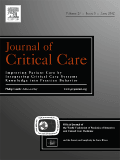
JOURNAL OF CRITICAL CARE
Leading the Charge in Critical Care InnovationJOURNAL OF CRITICAL CARE, published by W B SAUNDERS CO-ELSEVIER INC, is a prestigious peer-reviewed journal in the field of critical care and intensive care medicine. With an impressive Q1 classification in 2023, it stands as a leading publication among its peers, ranking #12 out of 110 in the Scopus database, which places it in the 89th percentile of critical care-related journals. Established in 1986 and with a converged timeline extending to 2025, the journal serves as a critical resource for international researchers, healthcare professionals, and students dedicated to advancing practices and understanding within the realm of critical care. Although it does not offer Open Access, the journal provides high-quality, rigorously reviewed articles that address contemporary issues, innovative techniques, and groundbreaking research in critical care medicine. By fostering scholarly dialogue and disseminating new knowledge, the JOURNAL OF CRITICAL CARE is pivotal in shaping the future of intensive patient care and enhancing health outcomes.
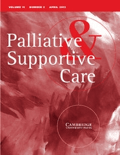
Palliative & Supportive Care
Empowering Professionals in Palliative ExcellencePalliative & Supportive Care, published by Cambridge University Press, is a pivotal journal dedicated to advancing research and practice in the fields of palliative care, supportive care, and the psychological aspects of terminal and chronic illness. With a robust ISSN of 1478-9515 and an E-ISSN of 1478-9523, this esteemed journal has established itself as a vital resource for professionals, researchers, and students who are committed to improving the quality of life for patients facing serious health challenges. Featuring peer-reviewed articles that span clinical psychology, medicine, nursing, and psychiatry, it holds a respectable impact factor, ranking Q2 in Clinical Psychology, Medicine, and Nursing as per the 2023 category quartiles. The journal is based in the United Kingdom and has been contributing to the field since its inception in 2003. Although it currently does not offer Open Access, its rigorously curated content underscores its relevance and importance in facilitating interdisciplinary dialogue and innovation in palliative and supportive care. For those seeking to stay at the forefront of research, Palliative & Supportive Care remains an indispensable platform for scholarly communication and discovery.